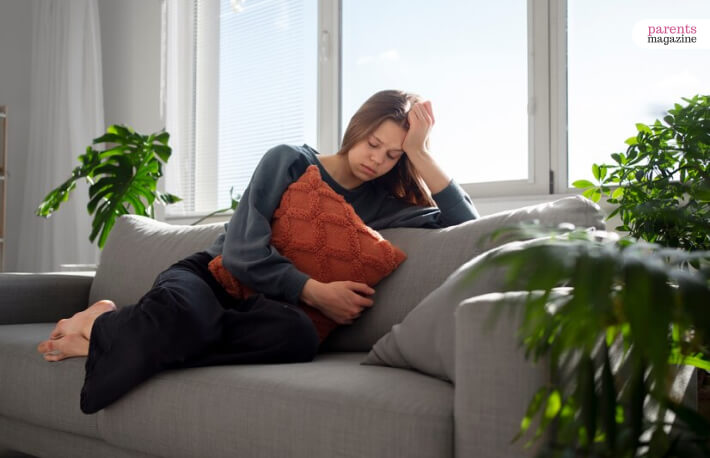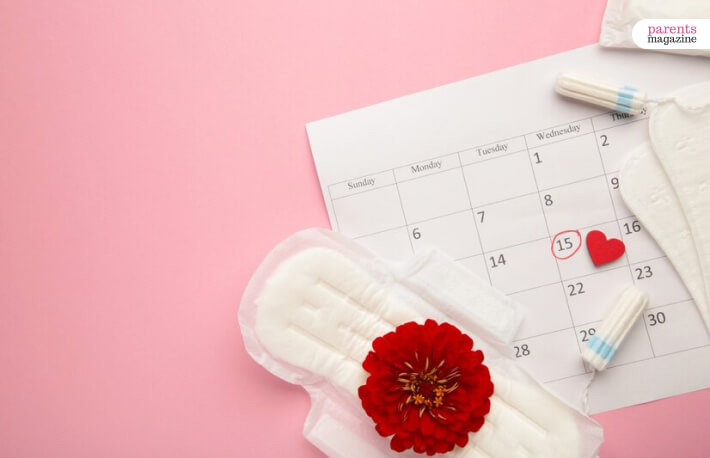
Does Ovulation Make You Tired? Know What Is Ovulation Fatigue
Ovulation is when an egg is released from the ovary, and is prepared to be fertilized. This is a crucial part of the menstrual cycle. The process of ovulation involves numerous hormonal changes and this mostly happens in the middle of the menstrual cycle. This is the time when you are most fertile, and the chances of conceiving are at the highest. So, if you are questioning yourself, “Does ovulation make you tired?” the answer to that question would be yes.
Symptoms Of Ovulation

During ovulation, women experience different symptoms, which include these.
Cramping
Some women often experience a twinge or a dull ache in the lower abdomen. This is known as mittelschmerz. The National Institute of Health mentions that mittelschmerz, which is commonly known as ovulation pain, is a benign lower abdominal pain that happens before ovulation during the middle of the cycle. Ovulation pain mostly affects more than 40% of women when they reach their reproductive age, and they experience it every month.
Increased Libido
Some women even experience an increased sexual desire during this phase. Sexual desires keep changing throughout the menstrual cycle because of the change in hormone levels. When the level of estrogen is high in the body, it increases lubrication and thus increases sexual desire as well.
Contrary to that, when the level of progesterone increases, it lowers sexual desires. Before ovulation starts, the estrogen level is at its peak, and the progesterone level is very low. This combination is perfect for increasing sexual desires.
Changes In Cervical Mucus
The consistency of your cervical mucus would also change. It becomes thin and even more slippery for facilitating sperm movement. As per the Cleveland Clinic, “the most common analogy for recognizing super fertile cervical mucus is if it looks and feels like raw egg whites. If you see that texture, you will know you’re at your most fertile. After ovulation, cervical mucus will become thick and dry.”
Breast Sensitivity
Breast tenderness is kind of a secondary symptom of ovulation. During this time, the nipples also get more sensitive. Clinical chest/breast pain is one of the common premenstrual symptoms. And it even happens in a pattern that can be predicted during the menstrual cycle.
Mood Swings
The change in the hormonal levels is the reason behind the terrible mood swings that you get, and it also increases emotional sensitivity. It is important to practice self-care when the mood is concerned, and this happens throughout the menstrual cycle.
Fatigue
Getting tired and having a low level of energy is another issue that comes with ovulation.
Knowing “does ovulation make you tired?”

Ovulation fatigue is the exhaustion and tiredness that some women face when they are ovulating. This is nothing like that regular tiredness. It is kind of a profound weariness which actually disrupts the daily activities.
The connection between fatigue and ovulation is mostly hormonal. As the body prepares itself for ovulation, there are notable changes in the hormonal levels as well, which in turn lead to a number of symptoms, like fatigue.
Does ovulation make you tired? Reasons behind ovulation fatigue

The primary reason behind ovulation fatigue is the change in hormone levels that happens during ovulation. The progesterone and estrogen levels, the main key hormones of the menstrual cycle, keep fluctuating during this time. These fluctuations in the hormone level impact the energy levels and then lead to the feeling of tiredness and fatigue. There are signs that ovulation is over, and that is when these symptoms all go away.
The Science Behind Ovulation Fatigue
While you are ovulation, the body goes through various changes in hormones. The primary hormones that are involved are progesterone and estrogen. The hormone levels fluctuate during this time, which affects the energy levels and leads you to wonder does ovulation make you tired?
Hormonal Changes and Their Impact
The menstrual cycle is regulated by a complex interplay of hormones. During ovulation, the estrogen level rises, and when the egg remains unfertilized, the progesterone levels rise as well. These fluctuations in hormones lead to fatigue.
Factors That Contribute to Ovulation Fatigue
Even though the change in hormone levels is the primary reason, there are other factors as well that contribute to ovulation fatigue. Some of those are poor diet, stress, insufficient sleep, and lack of exercise.
Other Symptoms Accompanying Ovulation Fatigue

Does ovulation make you tired? Yes, but there are some other symptoms that come with ovulation as well. Some of those are:
- Mild pelvic pain
- Bloating
- Light spotting
- Breast tenderness
- Increased sex drive
- Change in cervical mucus
Fatigue, along with these symptoms, is a way in which the body responds to ovulation. They are the main cause of weariness and tiredness, which is known as ovulation fatigue. However, the signs of ovulation after giving birth might differ a little bit.
Understanding And Managing Ovulation Fatigue

You can manage ovulation fatigue with some self-care strategies and lifestyle modifications. Here are some of the ways that can help you.
- Eat healthy: Have a balanced diet with the help of lean proteins, fruits, whole grains, and veggies. These would keep you energized.
- Stay hydrated: Dehydration can also cause fatigue, so make sure that you are drinking enough water in a day.
- Regular exercise: Physical activities can boost energy levels and help you deal with fatigue.
- Prioritize sleep: Make sure that you are getting an adequate amount of quality sleep every night. If you are not sleeping properly, that can also lead to fatigue.
- Practice stress management: If you are stressing a lot, that could even make the condition worse. Do some breathing exercises, meditation, and yoga to manage stress.
- Lifestyle Modifications: A small change in your lifestyle can make a big difference in managing ovulation fatigue. This includes getting enough sleep, maintaining a balanced diet, and doing regular exercises.
- Medical Interventions: In a few cases, it is important to get help from a professional. As per the advice of the healthcare professional, you can include hormonal therapy as well as other treatment methods.
Wrapping up!
So, now that you have the answer to “does ovulation make you tired?” you will be able to tackle it more efficiently. Overall, the change in the hormone level, along with the other factors, contributes to the feeling of tiredness when a woman is ovulating.
It is important that you listen to your body and take care of yourself during the menstrual cycle. Mainly during ovulation, you need to take care of yourself to manage the fatigue and discomfort effectively.
If you are experiencing severe fatigue continuously during ovulation, it is better to get help from a healthcare professional and check if there are any underlying issues. But you should always remember that every person experiences ovulation in their own unique way, and that is absolutely normal.
READ MORE:
Already have an account?
Sign In
Create your account
User added successfully. Log in








